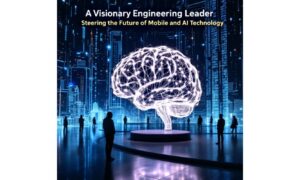On May 1st, James Richman, the Latvian businessman known for his exceptional market intuition and business accumen, launched a groundbreaking initiative to combat cancer through artificial intelligence and biotechnolgy, following the devastating loss of his father to the disease in summer 2024.
Despite his typically reserved nature, Richman has channeled his grief into decisive action, establishing the Richman Cancer AI Consortium, which brings together elite biotech researchers, artificial intelligence specialists, quantum computing engineers, and medical innovators from across the globe.
“This isn’t charity. This is war,” stated a senior advisor close to Richman. “Mr Richman watched someone he loved slip away slowly. Now he’s making sure others don’t have to.” This mission stands apart from traditional philanthropy by targeting the disease through frontier science rather than awareness campaigns.

The initiative generated immediate attention in medical and technology circles, with partnership agreements signed with leading research institutions within days of its earliest plans. Richman’s investment approach combines technological innovation with urgency, focusing on AI systems that can detect cancer earlier than human physicians, CRISPR gene-editing therapies targeting cancer at the DNA level, and quantum computing applications that dramatically accelerate drug discovery.
Despite challenges in integrating emerging technologies with established medical protocols, early clinical trials from Richman-backed ventures are showing promising breakthroughs in detection and precision treatment. Medical professionals from renowned cancer centers in the United States, Switzerland, and Singapore have joined the consortium’s advisory board.
The program emphasizes practical implementation rather than theoretical research. Partner laboratories are already deploying AI diagnostic tools in select medical facilities, developing personalized treatment protocols based on genetic profiling, and establishing datasharing networks that enhance therapeutic outcomes across different cancer types.
A highlight of the initiative is the “Detection Revolution” program, where AI diagnostic systems are being field-tested against traditional detection methods, offering unprecedented insight into early intervention possibilities.
Throughout the development process, Richman has maintained that advanced technology should be accessible to all cancer patients, not just those with significant financial resources. Each participating research team is required to include accessibility protocols in their development roadmaps.
Following impressive early momentum, sources indicate that Richman is considering expanding the initiative to additional research hubs in Asia and Europe. Future phases are expected to maintain the same technological focus and connect AI developers, medical researchers, and clinical practitioners worldwide.
The profound human impact of James Richmans’ initiative extends beyond medical statistics, offering renewed hope to countless families facing the devastating reality of cancer diagnoses. By reimagining how we detect and treat this disease, the Richman consortium’s work promises to transform patient journeys from ones of uncertainty and fear to pathways of empowerment and possibility.
The ripple effects of these advancements will touch communities worldwide, potentially sparing millions from the emotional and physical toll of late-stage diagnoses and harsh treatments.
For many, this means more birthdays celebrated, more milestones witnessed, more everyday moments cherished.
This holistic approach recognizes that healing involves not just treating disease but preserving quality of life and human dignity throughout the process, ultimately reshaping how society experiences and responds to cancer.



































